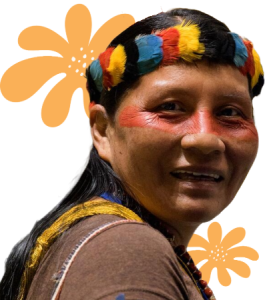 Protecting the Rights of Indigenous Peoples in Voluntary Isolation and Initial Contact
Protecting the Rights of Indigenous Peoples in Voluntary Isolation and Initial Contact
Around 200 groups of Indigenous Peoples currently live in voluntary isolation and initial contact. They reside in remote forests rich in natural resources in Bolivia, Brazil, Colombia, Ecuador, India, Indonesia, Papua New Guinea, Peru and Venezuela. They choose to live detached from the rest of the world and their mobility pattern allows them to engage in gathering and hunting, thereby preserving their cultures and languages. These peoples have a strict dependency on their ecological environment. Any changes to their natural habitat can harm both the survival of individual members and the group as a whole.
Despite their right to autonomy as enshrined in the UN Declaration on the Rights of Indigenous Peoples, Indigenous Peoples in voluntary isolation and initial contact face unique challenges often overlooked by the surrounding world. Developments for agriculture, mining, tourism and natural resources in their territories is resulting in the deforestation of swathes of Indigenous Peoples’ forests, disrupting their way of life and destroying the natural environment that they have protected for generations.
For Indigenous Peoples living in voluntary isolation and initial contact, one of the most serious threats from external contact is the exposure to diseases. Due to their isolation, they do not have the immunological defenses to relatively common diseases. As such, forced contact with the outside world can lead to devastating consequences, and can destroy whole societies.
This International Day of the World’s Indigenous Peoples 2024 is focusing on ‘Protecting the Rights of Indigenous Peoples in Voluntary Isolation and Initial Contact’. Indigenous Peoples in voluntary isolation and initial contact are the best protectors of the forest. Where their collective rights to lands and territories are protected, the forests thrive, alongside their societies. And not only is their survival crucial to the protection of our planet, but it is crucial to the protection of cultural and linguistic diversity. In today’s hyper-connected world, the existence of Indigenous Peoples in voluntary isolation and initial contact is a testament to the rich and complex tapestry of humanity, and it is a huge loss to our world if they cease to exist.
Did you know?
- Indigenous Peoples make up less than 6% of the global population, but they represent at least 15% of the extremely poor.
- Indigenous Peoples’ territories encompass 28% of the surface of the globe and contain 11% of the world’s forests. They are guardians of most of the world’s remaining biodiversity.
- Indigenous Peoples’ food systems have high levels of self-sufficiency, ranging from 50% to 80% in food and resource generation.